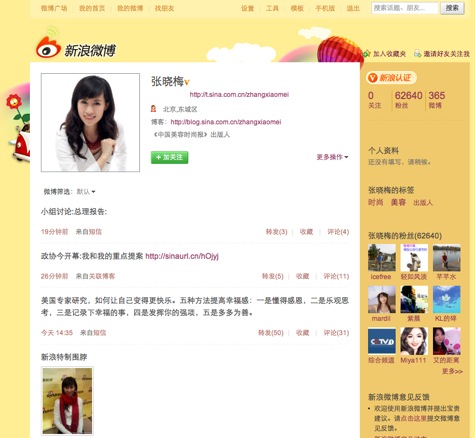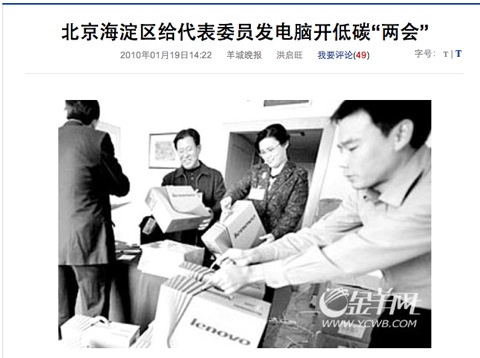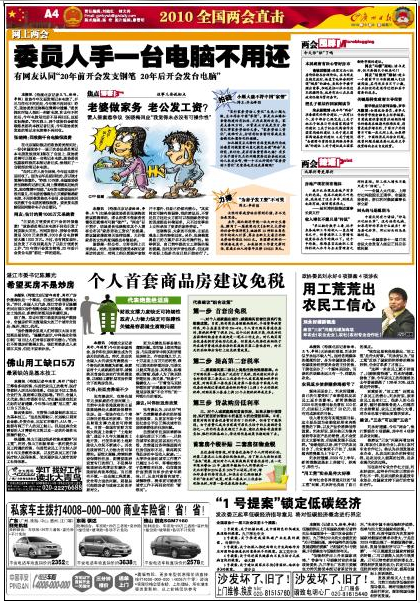By David Bandurski — As China’s annual National People’s Congress opened yesterday, many news headlines pounced on Premier Wen Jiabao’s remarks toward the end of his NPC report (see tab 11), in a section on anti-corruption, about the need for leaders to report their personal assets. But in the margins, commentators railed against shady practices nearer at hand — more than 2,000 laptop computers given away to delegates at the public’s expense.
The laptop story bubbled up out of China’s social media sphere back on March 2, when Chinese Internet users noted an odd mini blog entry from Zhang Xiaomei (张晓梅), a delegate to the Chinese People’s Political Consultative Conference (CPPCC) who is also the publisher of Beauty Fashion magazine. [See Zhang’s weblog here].
Zhang’s entries were succinct, mostly mundane summaries of preparations and speeches ahead of the two meetings.
CPPCC Chairman Tao says: being a national delegate to the CPPCC is a glorious mission, and a post for political participation and discussion. Sichuan party secretary Liu Qibao (刘奇葆) says: last year was the toughest year, this year is the most complex.
But in one entry she wrote: “When delegates report [to the meeting] they each get a laptop computer. What is different from last year is that this year these don’t need to be returned after we’re done with them. This is much more practical.“

[ABOVE: CPPCC delegate Zhang Xiaomei casually revealed the practice of free laptops for delegates on her mini blog at Sina.com]
Web users were angry and incredulous. Free computers for delegates?
A Guangzhou Daily story on March 3 followed up on this news, and confirmed that CPPCC delegates were indeed being gifted with laptop computers:
This year the CPPCC is again giving out laptop computers, but unlike previous years, this year they do not need to be returned! CPPCC delegate Zhang Xiaomei revealed on her mini blog that, “When delegates report [to the meeting] they each get a laptop computer. What is different from last year is that this year these don’t need to be returned after we’re done with them. This is much more practical.” Yesterday evening, two CPPCC press liaisons confirmed to this newspaper’s reporter that the computers being handed out to delegates this year do not need to be returned.
Sitting on the registration table at the Beijing International Hotel is a document called “Notice on the Issuing of Laptop Computers to Delegates to the Third Session of the Eleventh CPPCC,” saying that delegates may take with them one laptop computer.
[ABOVE: Guangzhou Daily reports on free computers for CPPCC delegates at the top of its “two meetings” coverage in its March 3 edition.]
A commentary at Dahe Daily thought the policy stank of behind-the-scenes commercial dealings. They wanted to know who was cashing in on this government hand-out.
What brand of computers are being provided? How much for each one? I understand there are 5,100 delegates to the NPC and CPPCC, and if everyone is entitled to a laptop at 5,000 yuan a pop, that comes to 25 million yuan. 25 million yuan! That’s no small amount. I’m not sure how which brand managed to obtain this order. But I’m sure it wasn’t simple, and probably required slipping over a few red envelopes.
Well, as it turns out, they are gifting Lenovo laptops this year, as CPPCC delegate Zhang Jiaji (张嘉极) confirmed to the Guangzhou Daily reporter.
And that must be music to the ears of NPC delegate Liu Chuanzhi (柳传志) and CPPCC delegate Yang Yuanqing (杨元庆), who are respectively the CEO and board chairman of Lenovo Group. Together, incidentally, they make up one-third of delegates to the “two meetings” from the IT sector.
Internet users quickly estimated that more than 2,000 laptops for the CPPCC, at an estimated value of 5,000 yuan each, would cost — presumably, the taxpayer — upwards of 10 million yuan, or roughly 1.5 million US dollars. And if laptops were being given to delegates to both of the “two meetings,” including NPC delegates, that would mean, as Dahe Daily said, about 5,100 computers for a total of around 25 million yuan.
Shortly after the Guangzhou Daily story appeared on March 3, an open letter appeared online protesting the irresponsible decision to hand out free computers to delegates:
In short, as the haze of the financial crisis has still not cleared, and state funds are of a limited nature, as the people are beset with immediate concerns . . . this action shows little consideration for the livelihood of the people, and is a political misstep.
Lawyer and editorial writer Yang Tao (杨涛) wrote on his QQ blog that clean governance should begin with small and immediate details — like not accepting unreasonable gifts.
Lately, we have entered the age of the computer and the Internet. For the sake of convenience in their work, it may be understandable for the organizers of the ‘two meetings’ to temporarily provide computers for delegates . . . The problem is, why is it that these computers do not need to be returned after they have been used? . . .
And so, I entreat our delegates and committee members to begin [their concern for clean government] by monitoring those things right next to them. They should say “NO” to those things that may be personally beneficial to them, but which are unfair and unreasonable. Let our government organs revive the slogan, “Thriftiness in holding the two meetings”!
In an interview with Jian Guangzhou (简光洲), the reporter for Shanghai’s Oriental Morning Post who broke the poisoned milk scandal back in late 2008, Zhang Xiaomei defended the handing out of laptops as an act promoting the use of computers at the political session.
Jian Guangzhou: But delegates generally have their own laptops. Do you think that by giving each [delegate] a new one, the state will be seen as wasting taxpayers’ money?
Zhang Xiaomei: Sure, delegates are able to buy them. But giving computers at the meetings will generate a certain atmosphere, with everybody using them. This serves to promote the idea.
Jian Guangzhou: Is this money also figured into the budget for the CPPCC session?
Zhang Xiaomei: This is something we don’t know.
Apparently, this is not the first government computer giveaway this year. Guangzhou’s Yangcheng Evening News reported back on January 19 that Beijing’s Haidian District had purchased 750 laptop computers for its people’s congress and consultative congress delegates, at a total cost of around five million yuan.
An opinion piece in Guangzhou Daily railed against this action. While Haidian District officials explained that this was a move to “save on the cost of paper,” an explanation that has also been given this week, Guangzhou Daily countered that delegates would fall into one of two categories. Either they would already have computers, bought personally or provided by their work units. Or they would not have computers, in which case they would probably be unable to use them properly anyway.
So what brand of laptop do Haidian District delegates now have sitting in their homes? See for yourself, courtesy of Yangcheng Evening News.

[Posted by David Bandurski, March 6, 2010, 12:06am HK]
[Frontpage image by Masaru Kamikura available at Flickr.com under Creative Commons license.]





















